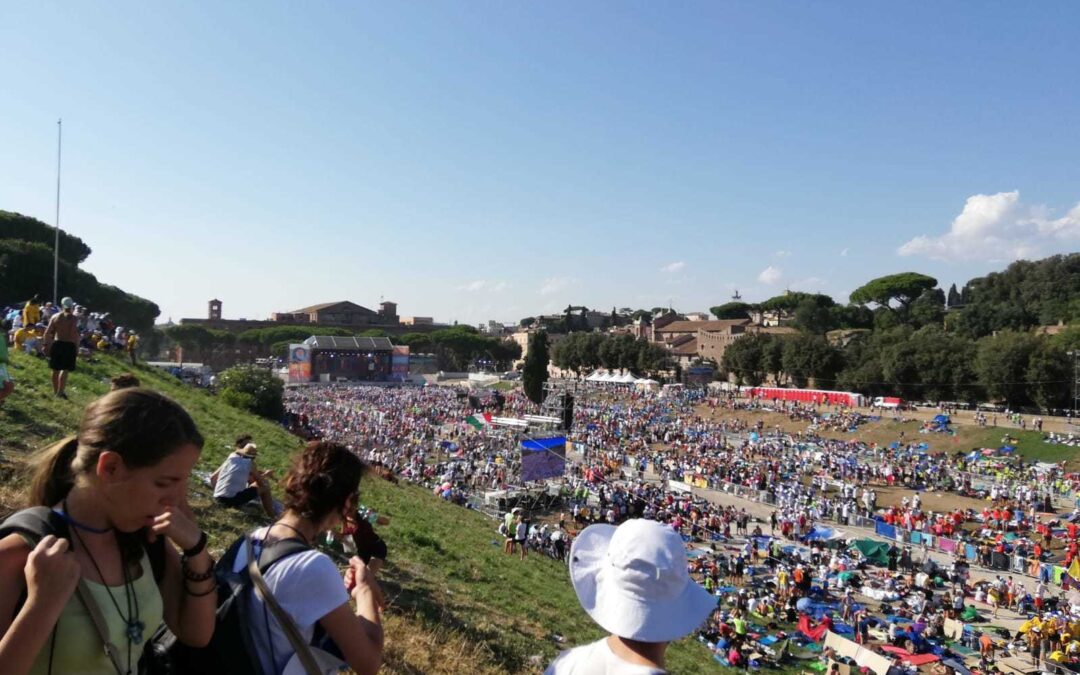
20 Aug 2018 | Focolare Worldwide
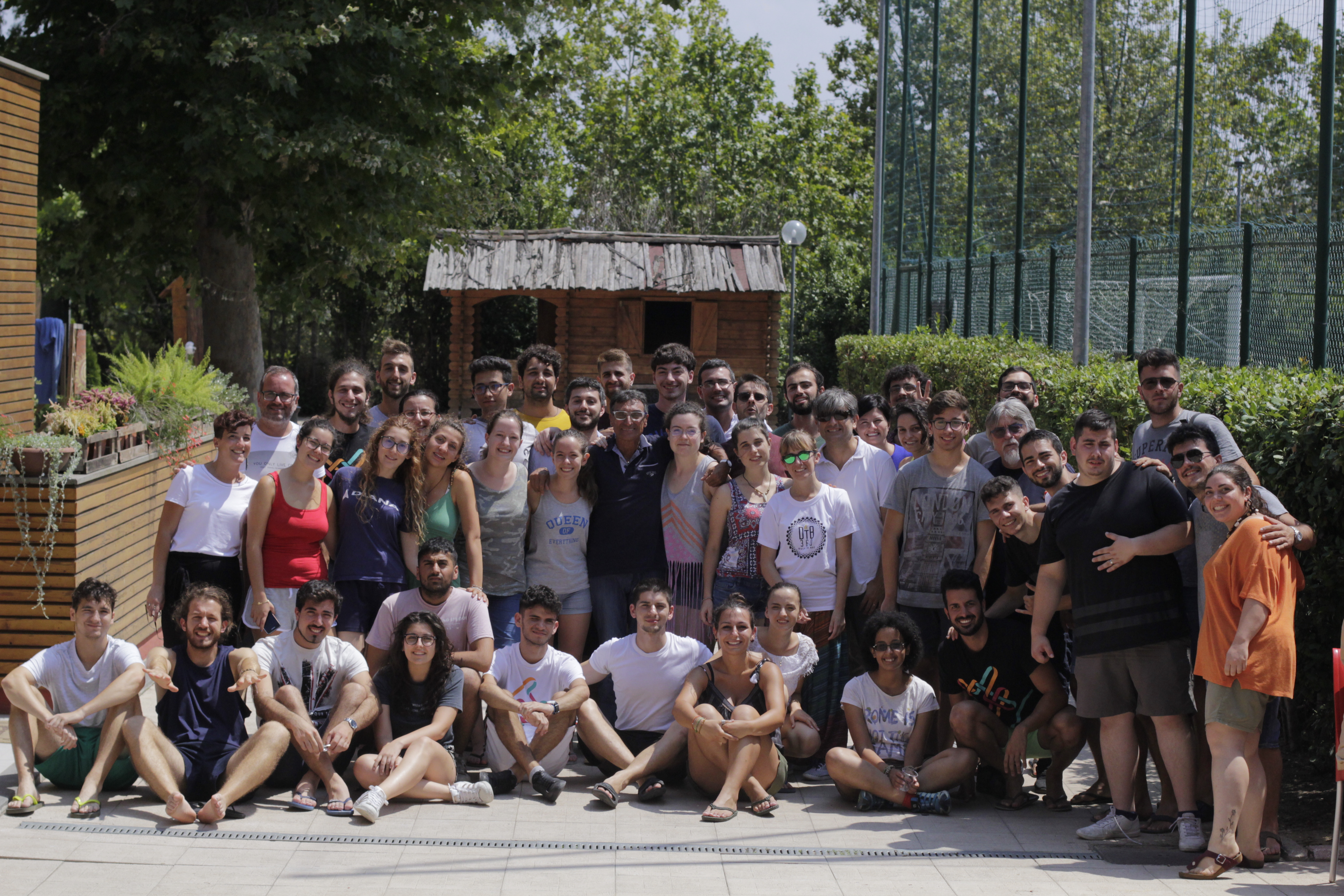 The Paper Mill, former factory at the periphery of Turin, northern Italy, thanks to a development process no longer looks like an abandoned facility. After which, it turned into a place of vitality and fresh air, thanks to the Turin Summer Campus organised by Youth for a United World, from 28 July to 6 August. A newly launched event, ideated to bring the outskirts towards the centre, and which saw an alternation of educational moments and concrete action. The strong point was the participation of the children of the zone, of different nationalities and cultures, who, with the youth of the Campus with simplicity and fun, created a recital, the outcome of the commitment and cooperation that arose during the artistic workshops (recycle-painting, music, theatre, dance, singing). A wealth of talents that upheld the cultural diversities in the neighbourhood, considered not as a motive for social discrimination, but for dialogue and exchange of ideas. Also the themes faced in the educational sessions triggered reflections which called the youths to become active citizens, opening debates on intercultural dialogue, end of life, “green” engineering. In Rome the Summer Campus 2018 was held in the spirit of fun and commitment. The activities proposed in the Corviale district – a kilometre-long building known as the “Snake” – were various types of music workshops, murals and clay activities for the kids, and discussions on current issues, with the participation of experts, to reflect on the daily news and challenges: the peripheries, “grassroots” lawfulness, acceptance of the migrants from the social and juridical standpoints, participation in political life, the uselessness of war and media manipulation, origin and cause of new conflicts.
The Paper Mill, former factory at the periphery of Turin, northern Italy, thanks to a development process no longer looks like an abandoned facility. After which, it turned into a place of vitality and fresh air, thanks to the Turin Summer Campus organised by Youth for a United World, from 28 July to 6 August. A newly launched event, ideated to bring the outskirts towards the centre, and which saw an alternation of educational moments and concrete action. The strong point was the participation of the children of the zone, of different nationalities and cultures, who, with the youth of the Campus with simplicity and fun, created a recital, the outcome of the commitment and cooperation that arose during the artistic workshops (recycle-painting, music, theatre, dance, singing). A wealth of talents that upheld the cultural diversities in the neighbourhood, considered not as a motive for social discrimination, but for dialogue and exchange of ideas. Also the themes faced in the educational sessions triggered reflections which called the youths to become active citizens, opening debates on intercultural dialogue, end of life, “green” engineering. In Rome the Summer Campus 2018 was held in the spirit of fun and commitment. The activities proposed in the Corviale district – a kilometre-long building known as the “Snake” – were various types of music workshops, murals and clay activities for the kids, and discussions on current issues, with the participation of experts, to reflect on the daily news and challenges: the peripheries, “grassroots” lawfulness, acceptance of the migrants from the social and juridical standpoints, participation in political life, the uselessness of war and media manipulation, origin and cause of new conflicts. 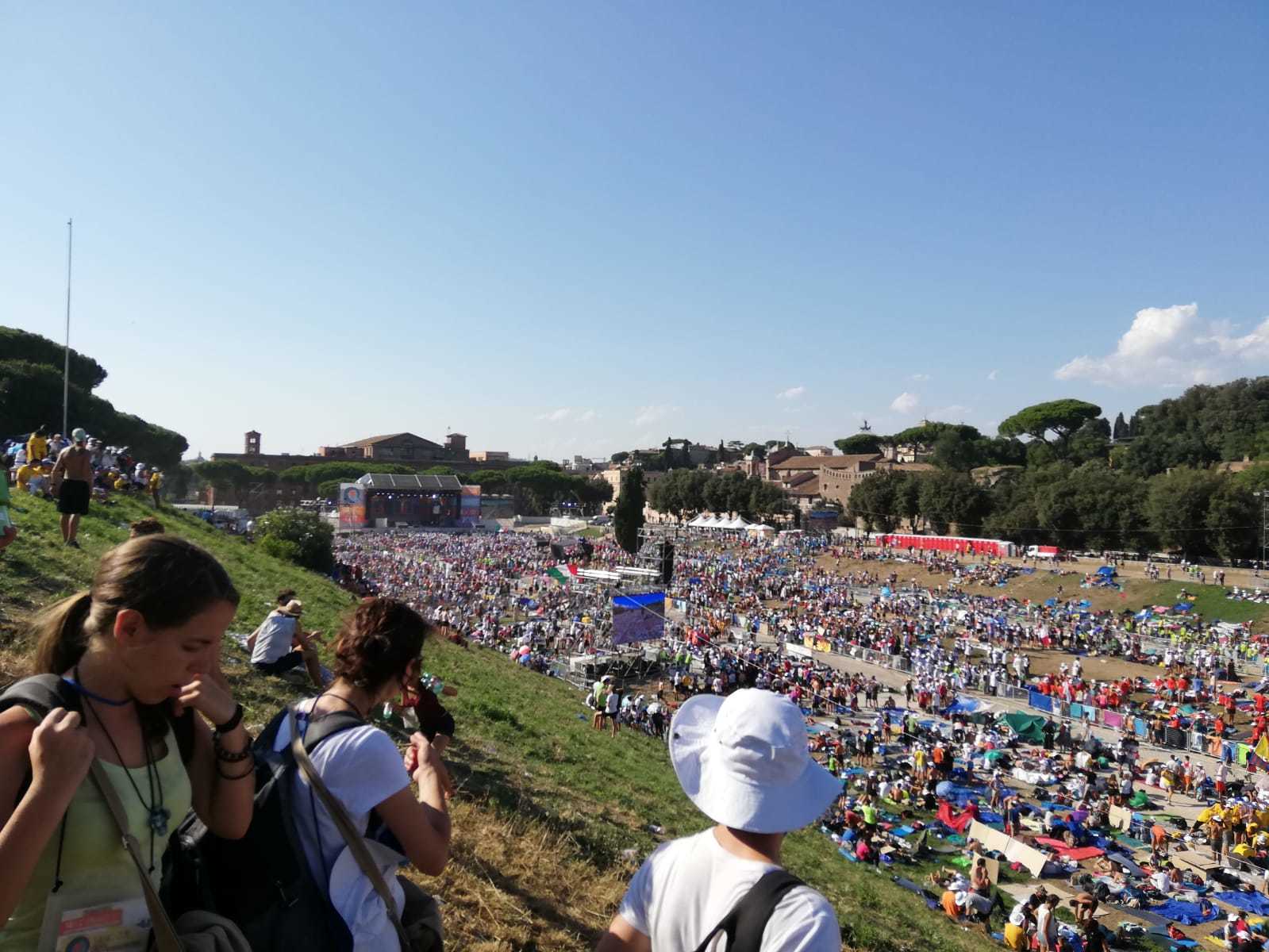 Besides the district associations, also some of the 8,000 families living in the “Snake” opened their doors and recounted their stories of suffering and hope. That which, at first glance seems to be an important building, and the end of which is invisible to the eye, seems to be a beehive of identical homes and windows, from inside is not scary: this is what the young people of the Campus felt, thanks to the encounter with people, countenances and stories which enabled all to go beyond the borders and prejudices, and above all the cement wall each carries within. The youth of the campus, children and families of Corviale worked together to prepare the final celebration in the district parish. It was an occasion to demonstrate the fruits of the workshops but also to build a chain between the realities, often diverging, of the territory and rediscover a sense of community and family. The main path of this campus which ended on 11 and 12 August, at Circo Massimo in Rome, with the meeting of the over 70,000 pilgrim youths from all over Italy, with Pope Francis, then in St. Peter’s, with the Mass and Angelus. The pope invited each one not to be “couch potato youths,” not to aspire tranquility, but take the risk of bravely pursuing their own dreams. The experiences lived in the peripheries of Turin and Rome were engines that pushed each campus participant to take the first steps along this path, challenging but necessary, to make their own dreams a reality.
Besides the district associations, also some of the 8,000 families living in the “Snake” opened their doors and recounted their stories of suffering and hope. That which, at first glance seems to be an important building, and the end of which is invisible to the eye, seems to be a beehive of identical homes and windows, from inside is not scary: this is what the young people of the Campus felt, thanks to the encounter with people, countenances and stories which enabled all to go beyond the borders and prejudices, and above all the cement wall each carries within. The youth of the campus, children and families of Corviale worked together to prepare the final celebration in the district parish. It was an occasion to demonstrate the fruits of the workshops but also to build a chain between the realities, often diverging, of the territory and rediscover a sense of community and family. The main path of this campus which ended on 11 and 12 August, at Circo Massimo in Rome, with the meeting of the over 70,000 pilgrim youths from all over Italy, with Pope Francis, then in St. Peter’s, with the Mass and Angelus. The pope invited each one not to be “couch potato youths,” not to aspire tranquility, but take the risk of bravely pursuing their own dreams. The experiences lived in the peripheries of Turin and Rome were engines that pushed each campus participant to take the first steps along this path, challenging but necessary, to make their own dreams a reality.
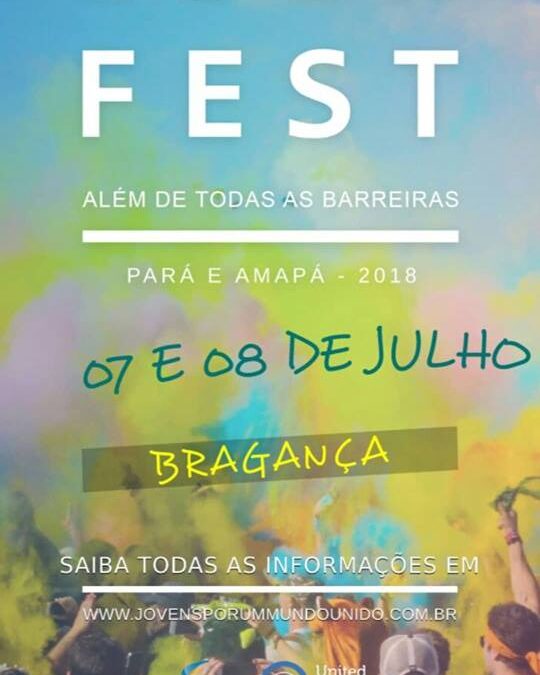
20 Aug 2018 | Focolare Worldwide
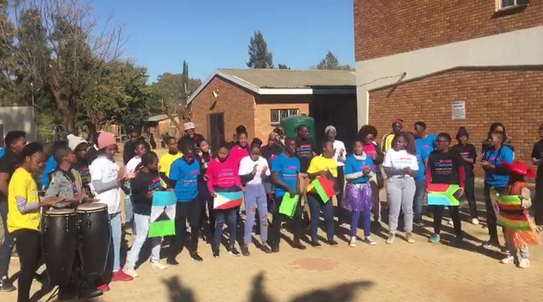 “This year we held our Youth Camp in Mafikeng, South Africa, precisely contemporaneously with the Genfest in the Philippines, with participants from Zimbabwe, Malawi, Zambia, Lesotho and South Africa. The presence of young people from various countries was in itself a visible sign of our desire to overcome the personal and cultural confines.” Mafikeng (Mafeking, up to 1980) is the capital, as well as a commercial centre of the North-west province, founded in 1885 as the British military outpost.It is currently an important stopover on the railway line from Cape City to Zimbabwe. “It was very interesting and funny to discover how our cultures differ and how we can still love one another in our diversities. I have learned many things -wrote Teddy, from Zambia –which I don’t want to keep to myself,but share with my brethren. The Youth Camp – says Nkosiphile from Zimbabwe – opened my eyes. I just can’t wait to put into practice all I have learned.”
“This year we held our Youth Camp in Mafikeng, South Africa, precisely contemporaneously with the Genfest in the Philippines, with participants from Zimbabwe, Malawi, Zambia, Lesotho and South Africa. The presence of young people from various countries was in itself a visible sign of our desire to overcome the personal and cultural confines.” Mafikeng (Mafeking, up to 1980) is the capital, as well as a commercial centre of the North-west province, founded in 1885 as the British military outpost.It is currently an important stopover on the railway line from Cape City to Zimbabwe. “It was very interesting and funny to discover how our cultures differ and how we can still love one another in our diversities. I have learned many things -wrote Teddy, from Zambia –which I don’t want to keep to myself,but share with my brethren. The Youth Camp – says Nkosiphile from Zimbabwe – opened my eyes. I just can’t wait to put into practice all I have learned.” 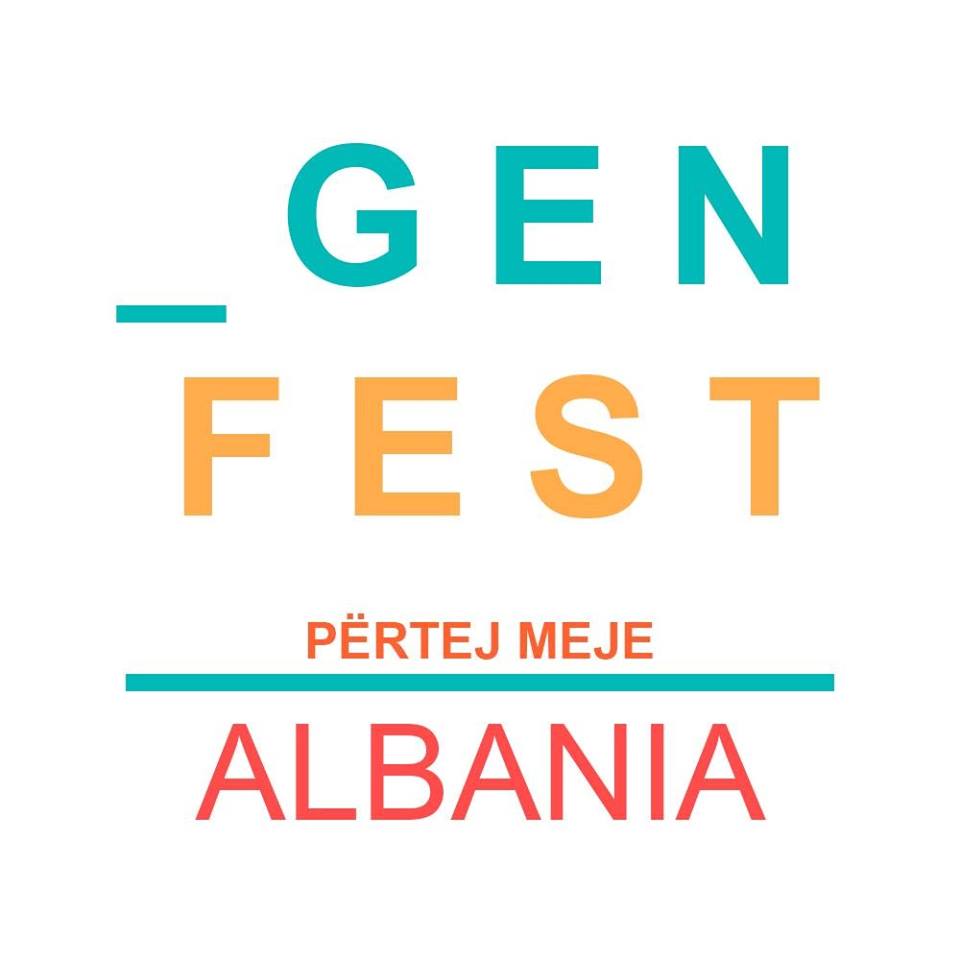 Simultaneously with the event in the Philippines, was also the one held in Albania, with about 120 participants consisting of Christians, Muslims, agnostics coming from various parts and cities of Albania, together with youths from Skopje (Macedonia) and a young girl from Stuttgart. “Like a weft, going from local to global realities, we held four workshops in the field of civil economy and culture of lawfulness, besides themes on prejudice, interpersonal relationships and the social networks, in the presence of Italian and Albanian experts. We visited the homes of disabled and homeless people, and got to meet some ecumenical and interreligious realities of the capital,
Simultaneously with the event in the Philippines, was also the one held in Albania, with about 120 participants consisting of Christians, Muslims, agnostics coming from various parts and cities of Albania, together with youths from Skopje (Macedonia) and a young girl from Stuttgart. “Like a weft, going from local to global realities, we held four workshops in the field of civil economy and culture of lawfulness, besides themes on prejudice, interpersonal relationships and the social networks, in the presence of Italian and Albanian experts. We visited the homes of disabled and homeless people, and got to meet some ecumenical and interreligious realities of the capital, 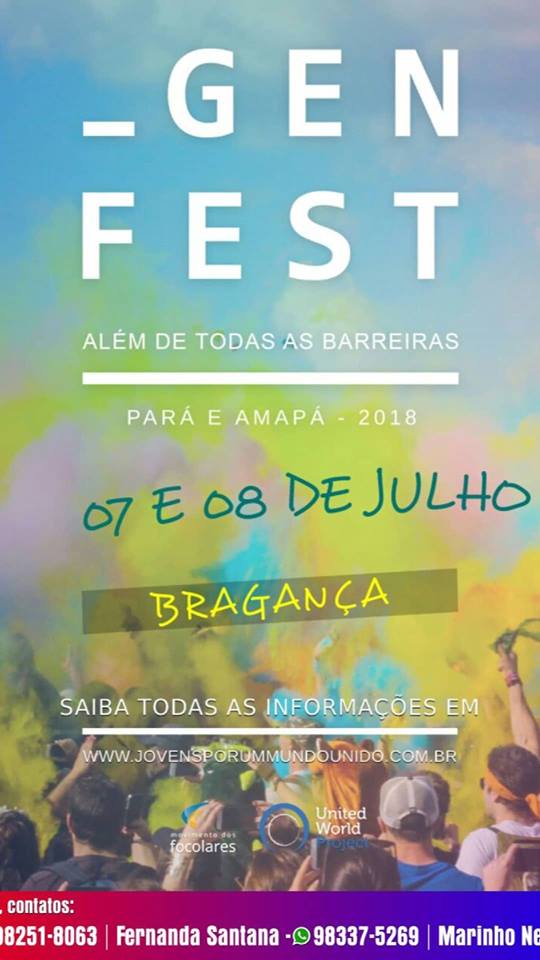 Tirana. The visits to the cathedral, accompanied by the bishop of the Orthodox Church of Albania, the Mosque and the National Centre of the evangelical Churches were followed by a “flash mob” of all the youths at Parku Rinjain the city centre. Genfest was accompanied by moments of celebrations and prayer, in a joyful atmosphere. It helped to connect the youths from the north and south of the country, and let them experience the international features of the new generations, who inherently tend to overcome all confines. A characteristic that stood out was that of working together with the Church in Albania in the preparation for the Synod of the youth, besides being an important step in reestablishing many relationships with Christians of other churches and Muslims, who now want to continue this path of dialogue.” Bragança, in the north-eastern part of Brazil, is the city where the Genfest was held for 300 young people from various cities of the State of Parà, which hosts a big section of the Amazon National Park. “For many of them – they wrote – it was the first contact with the Focolare communities. The programme consisted of some social projects in the city, like the Fazenda de la Esperança, a hospital, an ecumenical group, and other activities that helped us toenter into the real spiritof this event. So we illustrated the “Mundo Unido Project” and the proposal of Manila, “Paths of unity.” On the opposite bank of the Amazon River estuary in Macapà, there was another Genfest which gathered 140 young people. “It was a unique experience which we were able to concretise thanks to the support of all the members of the Focolare. Despite the difficulties, we believe that our objective, “beyond all borders,” has been reached.
Tirana. The visits to the cathedral, accompanied by the bishop of the Orthodox Church of Albania, the Mosque and the National Centre of the evangelical Churches were followed by a “flash mob” of all the youths at Parku Rinjain the city centre. Genfest was accompanied by moments of celebrations and prayer, in a joyful atmosphere. It helped to connect the youths from the north and south of the country, and let them experience the international features of the new generations, who inherently tend to overcome all confines. A characteristic that stood out was that of working together with the Church in Albania in the preparation for the Synod of the youth, besides being an important step in reestablishing many relationships with Christians of other churches and Muslims, who now want to continue this path of dialogue.” Bragança, in the north-eastern part of Brazil, is the city where the Genfest was held for 300 young people from various cities of the State of Parà, which hosts a big section of the Amazon National Park. “For many of them – they wrote – it was the first contact with the Focolare communities. The programme consisted of some social projects in the city, like the Fazenda de la Esperança, a hospital, an ecumenical group, and other activities that helped us toenter into the real spiritof this event. So we illustrated the “Mundo Unido Project” and the proposal of Manila, “Paths of unity.” On the opposite bank of the Amazon River estuary in Macapà, there was another Genfest which gathered 140 young people. “It was a unique experience which we were able to concretise thanks to the support of all the members of the Focolare. Despite the difficulties, we believe that our objective, “beyond all borders,” has been reached.
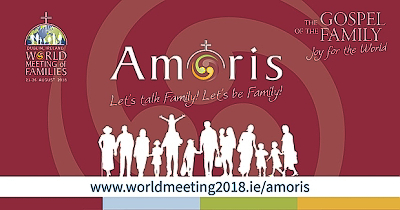
15 Aug 2018 | Focolare Worldwide
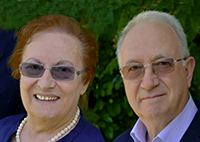 They attended all the World Meetings of Families, since the one held in Rome in1994. And at this year’s gathering in Dublin, they will share their testimony at the Pastoral Congress. They are Anna and Alberto Friso, once responsible for New Families, a branch of the Focolare Movement. They speak to Vatican news about the challenges faced by Christian families in today’s world, and of their expectations for the Meeting in Dublin which will have as its main theme Pope Francis’s apostolic exhortation Amoris laetitia (The Joy of Love). You paricipated as a family in all the World Meetings – a full quarter of a century! What has changed over the past 25 years for Christian families, in your opinion? Anna: The accent put on the new generations, the fact of no longer believing in “forever.” The challenge we must embrace is to get young people to perceive that love is an essential component of life and that it is a wellspring of happiness that married people bring. Turning to marriage doesn’t mean losing your freedom, but obtaining the possibility of a happy life! Alberto: Two things in particular characterize today’s society: individualism and relativism. There seems to be a lack of coesion in front of these two tendencies, the unity of the couple. This has meant that we Christians, we Christian families have to look deeper into God’s plan to see in what way He has called us to live in his image and likeness. As a family that has given such a long witness of Christian living, what would you feel like saying to a young couple that is stepping into marriage concerning eternal love? Alberto: What we feel like saying is: Keep in mind that the love between you that you felt in the first moments you felt these sentiments growing, is of extraordinary importance – eternal! It’s a spark of the deep value that will lie at the basis of your life, for the rest of your life, even when the storms come, and, it’s God’s love. Therefore, it’s not the two of you that get married, but the three of you, because Jesus will be with you! And, thank God, this means answers. The young people themselves become testimonies of this! Anna: The challenge is to not allow yourself be challenged by the dominating culture that focuses on feelings, personal rights that prevail over the other’s rights, or even over the value of the couple itself. God’s plan for marriage has this seal of happiness that it is possible bring to fulfillment precisely because it’s a very part of the person’s destiny, part of the DNA of every human being!
They attended all the World Meetings of Families, since the one held in Rome in1994. And at this year’s gathering in Dublin, they will share their testimony at the Pastoral Congress. They are Anna and Alberto Friso, once responsible for New Families, a branch of the Focolare Movement. They speak to Vatican news about the challenges faced by Christian families in today’s world, and of their expectations for the Meeting in Dublin which will have as its main theme Pope Francis’s apostolic exhortation Amoris laetitia (The Joy of Love). You paricipated as a family in all the World Meetings – a full quarter of a century! What has changed over the past 25 years for Christian families, in your opinion? Anna: The accent put on the new generations, the fact of no longer believing in “forever.” The challenge we must embrace is to get young people to perceive that love is an essential component of life and that it is a wellspring of happiness that married people bring. Turning to marriage doesn’t mean losing your freedom, but obtaining the possibility of a happy life! Alberto: Two things in particular characterize today’s society: individualism and relativism. There seems to be a lack of coesion in front of these two tendencies, the unity of the couple. This has meant that we Christians, we Christian families have to look deeper into God’s plan to see in what way He has called us to live in his image and likeness. As a family that has given such a long witness of Christian living, what would you feel like saying to a young couple that is stepping into marriage concerning eternal love? Alberto: What we feel like saying is: Keep in mind that the love between you that you felt in the first moments you felt these sentiments growing, is of extraordinary importance – eternal! It’s a spark of the deep value that will lie at the basis of your life, for the rest of your life, even when the storms come, and, it’s God’s love. Therefore, it’s not the two of you that get married, but the three of you, because Jesus will be with you! And, thank God, this means answers. The young people themselves become testimonies of this! Anna: The challenge is to not allow yourself be challenged by the dominating culture that focuses on feelings, personal rights that prevail over the other’s rights, or even over the value of the couple itself. God’s plan for marriage has this seal of happiness that it is possible bring to fulfillment precisely because it’s a very part of the person’s destiny, part of the DNA of every human being!  In Dublin, The Joy of Love will obviously play an important role. What is this post-synodal exhortation giving to Christian families, and not only Christian? Alberto: Most particularly, it urges us to give witness to Christianity especially through the way we live, the way we give witness to God’s love. When it comes to the world, it’s not so much that we have to defend a ideas, ways of thinking, or a particular value; we have to give witness to the fact that God is Love and that love lies in the depths of the human heart, even hearts that are going through the darkest crises. Anna: We’ve experienced this so so much, precisely because of its luminosity and also its concreteness that doesn’t come to terms with the doctrine, but is able to comprehend and give a hand to those who have been wounded by life. And to these people, most especially, it is able to offer the hope of finding a way to happiness even in the midst of problems. Its beauty lies in its being a hymn to love. Inside this document we can see all of the Church’s tenderness. I believe that it is really a gift for new generations of newlyweds. Source: Vatican News, August 10, 2018
In Dublin, The Joy of Love will obviously play an important role. What is this post-synodal exhortation giving to Christian families, and not only Christian? Alberto: Most particularly, it urges us to give witness to Christianity especially through the way we live, the way we give witness to God’s love. When it comes to the world, it’s not so much that we have to defend a ideas, ways of thinking, or a particular value; we have to give witness to the fact that God is Love and that love lies in the depths of the human heart, even hearts that are going through the darkest crises. Anna: We’ve experienced this so so much, precisely because of its luminosity and also its concreteness that doesn’t come to terms with the doctrine, but is able to comprehend and give a hand to those who have been wounded by life. And to these people, most especially, it is able to offer the hope of finding a way to happiness even in the midst of problems. Its beauty lies in its being a hymn to love. Inside this document we can see all of the Church’s tenderness. I believe that it is really a gift for new generations of newlyweds. Source: Vatican News, August 10, 2018
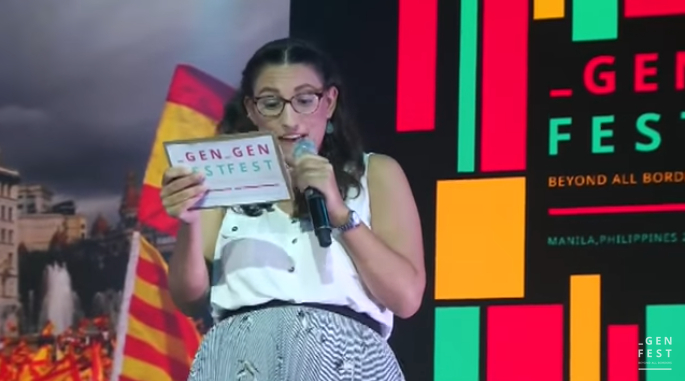
13 Aug 2018 | Focolare Worldwide
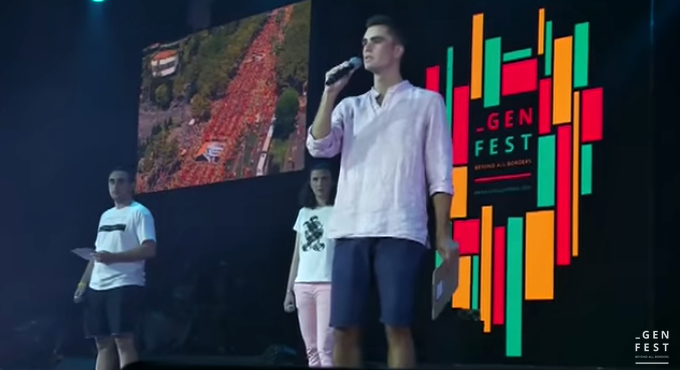 The referendum for independence held in Catalonia (Spain) on 1 October 2017, declared as illegal, gave rise to a season of strong political and social unrest and civil tension which directly involved all the sectors of the population, above all, the youth. Martì is Catalonian and comes from a city near Barcelona, but moved to Madrid for his studies. As a Gen, he shares the Focolare ideals of unity with other young people of various regions of Spain and recounted that “despite this common value, also with them in the first three months in Madrid, it had not been easy. Furthermore in the residence where I live I was maltreated because I was the only Catalonian. I held many discussions with the Gen and we continuously ended up getting angry. But one day, we decided to resolve this situation by talking among ourselves and really listening to one another. We began to see that this was the most important thing we had to do: go beyond our ideas and not foregoing dialogue amongst us, since the most important thing was to understand and respect one another. I can’t say that from then on the path was simpler, but we understood that problems are solved when we set ourselves in the condition of really listening, and not wanting to impose ourselves, the.
The referendum for independence held in Catalonia (Spain) on 1 October 2017, declared as illegal, gave rise to a season of strong political and social unrest and civil tension which directly involved all the sectors of the population, above all, the youth. Martì is Catalonian and comes from a city near Barcelona, but moved to Madrid for his studies. As a Gen, he shares the Focolare ideals of unity with other young people of various regions of Spain and recounted that “despite this common value, also with them in the first three months in Madrid, it had not been easy. Furthermore in the residence where I live I was maltreated because I was the only Catalonian. I held many discussions with the Gen and we continuously ended up getting angry. But one day, we decided to resolve this situation by talking among ourselves and really listening to one another. We began to see that this was the most important thing we had to do: go beyond our ideas and not foregoing dialogue amongst us, since the most important thing was to understand and respect one another. I can’t say that from then on the path was simpler, but we understood that problems are solved when we set ourselves in the condition of really listening, and not wanting to impose ourselves, the. 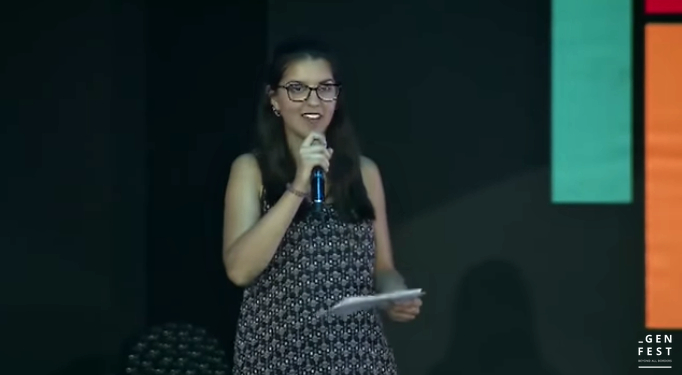 Alba is also Catalonian and recounted that the post-referendum period was a real test for her and for the other gen: on the social media some Gen had written their strong convictions about the political ideas of one or the other party, which hurt me deeply, but I didn’t stop to think whether my way of expressing myself could hurt those who do share my ideas. It was in those days that I started reflecting on what it meant for us, who often say that we are even ready to die for each other. When would we have to put this promise in practice? I felt that the time was now.
Alba is also Catalonian and recounted that the post-referendum period was a real test for her and for the other gen: on the social media some Gen had written their strong convictions about the political ideas of one or the other party, which hurt me deeply, but I didn’t stop to think whether my way of expressing myself could hurt those who do share my ideas. It was in those days that I started reflecting on what it meant for us, who often say that we are even ready to die for each other. When would we have to put this promise in practice? I felt that the time was now.  So we met up with all the gen from all of Spain to clarify things even if it was not easy since we were a big group and it was impossible to say all we felt. We continued to speak with some of them, like Laura. I remember that with her the situation was delicate because I did not know how we could face the problem without hurting each other. When she proposed to make a pact, that is, of putting love before everything else, I was taken off my feet! No one had ever proposed a similar thing to me but it worked because from that moment on we managed to dialogue. The objective was not to defend our ideas, but to take care of one another, and at the same time, leave room for free expression. This experience made me see the political situation differently, and understand that what matters is not to be on the reasonable side, but that beyond the ideas there is always the person and this is more important. Still today our opinions have not changed: we think differently and this is not easy. At times we have to ask excuse, but in talking, we reach the conclusion that both the positive and negative things are part of experience. The misunderstanding now has been transformed into something greater: it is not resignation, or only respect. It is that rose which is worth more than all the thorns put together.”
So we met up with all the gen from all of Spain to clarify things even if it was not easy since we were a big group and it was impossible to say all we felt. We continued to speak with some of them, like Laura. I remember that with her the situation was delicate because I did not know how we could face the problem without hurting each other. When she proposed to make a pact, that is, of putting love before everything else, I was taken off my feet! No one had ever proposed a similar thing to me but it worked because from that moment on we managed to dialogue. The objective was not to defend our ideas, but to take care of one another, and at the same time, leave room for free expression. This experience made me see the political situation differently, and understand that what matters is not to be on the reasonable side, but that beyond the ideas there is always the person and this is more important. Still today our opinions have not changed: we think differently and this is not easy. At times we have to ask excuse, but in talking, we reach the conclusion that both the positive and negative things are part of experience. The misunderstanding now has been transformed into something greater: it is not resignation, or only respect. It is that rose which is worth more than all the thorns put together.”
https://youtu.be/YwMdvyhDJeA?t=1428
12 Aug 2018 | Focolare Worldwide
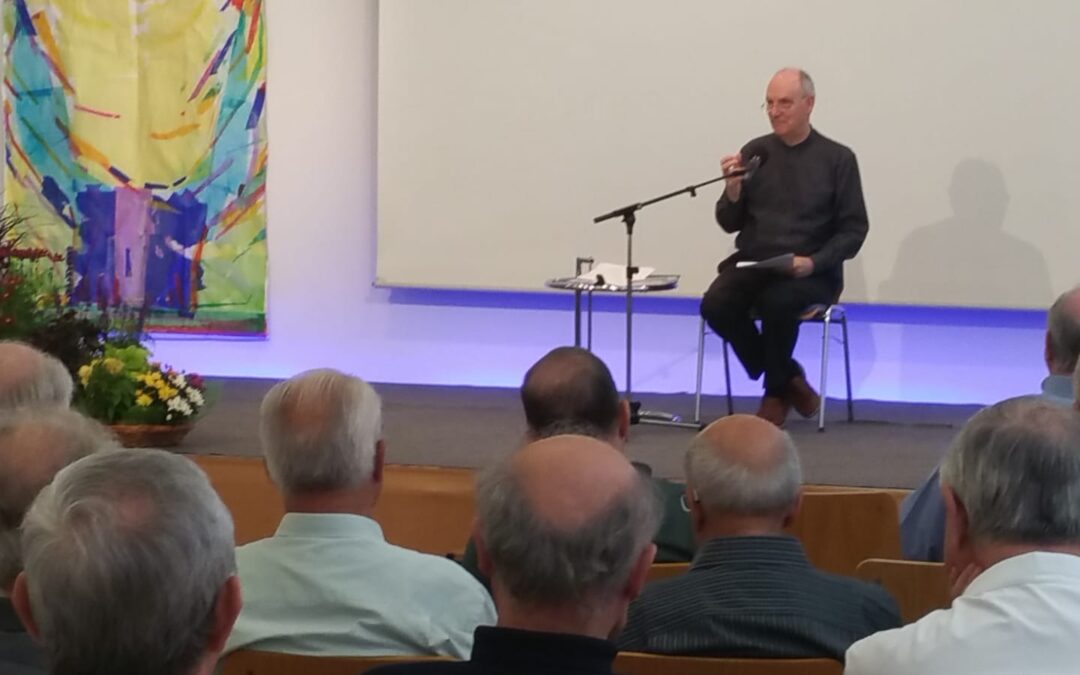
9 Aug 2018 | Focolare Worldwide
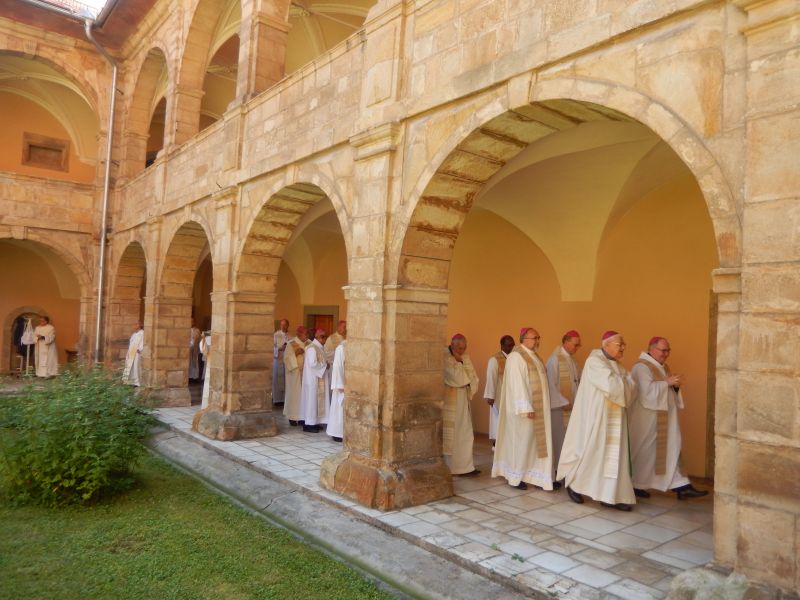 “We were invited to this enchanting place, the “green heart” of Austria, by Bishop Wilhelm Krautwaschl, current bishop of this 800 year-old diocese,” writes Thailand’s Cardinal Francis Xavier Kriengsak, who is coordinator of the Bishop Friends of the Focolare Movement. “For us, this this stay was an opportunity to live together as brothers, to share each other’s joys and sorrows, to regenerate our strength and to anchor ourselves once again in the essential.” History: The first meeting of Bishop Friends of the Focolare was held in 1977 upon the invitation of theologian Klaus Hemmerle (1929 – 1994), once bishop of Aquisgrana, Germany. That time, the meeting was attended by twelve bishops from five continents. At the General Audience in the Vatican, Pope Paul VI greeted them and encouraged them to go forward. At the next meeting when he met them for the last time, he said: “As the head of the Apostolic College, I strongly encourage you, I urge you, I exhort you to continue in this undertaking.” The same encouragement arrived from successive popes, including Pope Francis who sent his personal greetings. In 1981 these summer vacations with a small group of bishops were began. In 1984, Chiara Lubich invited them to “decisively launch themselves, along with the whole Work of Mary, towards the unity of the churches and dialogue with other religions and people of good will” in accordance with the Church’s and the Focolare spirituality’s objective. The bishops write: “That invitation provoked a leap in quality in our communion [with one another].”
“We were invited to this enchanting place, the “green heart” of Austria, by Bishop Wilhelm Krautwaschl, current bishop of this 800 year-old diocese,” writes Thailand’s Cardinal Francis Xavier Kriengsak, who is coordinator of the Bishop Friends of the Focolare Movement. “For us, this this stay was an opportunity to live together as brothers, to share each other’s joys and sorrows, to regenerate our strength and to anchor ourselves once again in the essential.” History: The first meeting of Bishop Friends of the Focolare was held in 1977 upon the invitation of theologian Klaus Hemmerle (1929 – 1994), once bishop of Aquisgrana, Germany. That time, the meeting was attended by twelve bishops from five continents. At the General Audience in the Vatican, Pope Paul VI greeted them and encouraged them to go forward. At the next meeting when he met them for the last time, he said: “As the head of the Apostolic College, I strongly encourage you, I urge you, I exhort you to continue in this undertaking.” The same encouragement arrived from successive popes, including Pope Francis who sent his personal greetings. In 1981 these summer vacations with a small group of bishops were began. In 1984, Chiara Lubich invited them to “decisively launch themselves, along with the whole Work of Mary, towards the unity of the churches and dialogue with other religions and people of good will” in accordance with the Church’s and the Focolare spirituality’s objective. The bishops write: “That invitation provoked a leap in quality in our communion [with one another].” 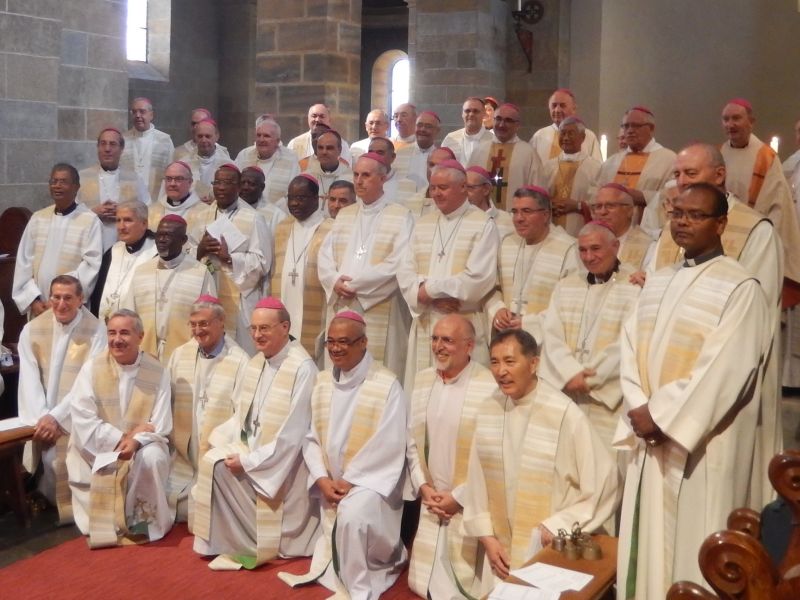 This year 63 prelates from 31countries attended, including Lutheran bishop Christian Krause, once president of the World Lutheran Federation. The goal was the same as always: “to enter more deeply and live the spirituality of communion” and to “explore the ways it could strengthen the Church’s journey” in various socio-cultural circumstances. The setting was the beautiful Palace of Seggau (XII century), ancient seat of the Bishop of Graz and now transformed into a conference centre immersed in lush green surroundings. The meeting opened amidst much joy and fraternity, they write, “with a review the beginnings of the bishops’ participation in the charism of unity, which has led them to aim for a life of communion not only during summer vacation, but also at a distance and throughout the whole year.”
This year 63 prelates from 31countries attended, including Lutheran bishop Christian Krause, once president of the World Lutheran Federation. The goal was the same as always: “to enter more deeply and live the spirituality of communion” and to “explore the ways it could strengthen the Church’s journey” in various socio-cultural circumstances. The setting was the beautiful Palace of Seggau (XII century), ancient seat of the Bishop of Graz and now transformed into a conference centre immersed in lush green surroundings. The meeting opened amidst much joy and fraternity, they write, “with a review the beginnings of the bishops’ participation in the charism of unity, which has led them to aim for a life of communion not only during summer vacation, but also at a distance and throughout the whole year.” 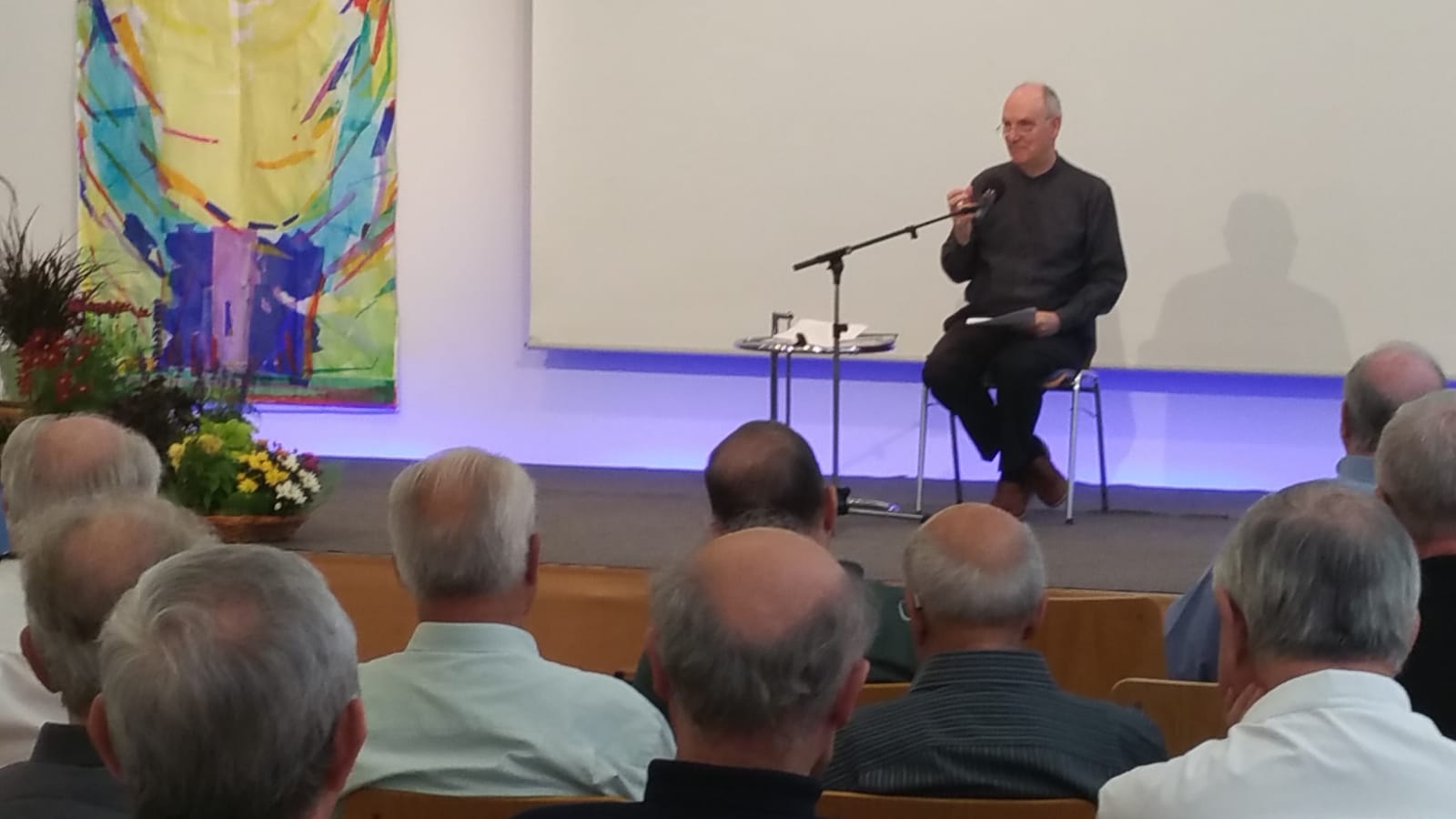 There were several presentations. Fr Fabio Ciardi, OMI, who is head of the Abba School, offered several reflections on Chiara Lubich’s experience of light in 1949. Archbishop Vincenzo Zan, Secretary of the Congregation for Catholic Education, described the Synod on young people that will take place in October. Bishop Brendan Leahy from Ireland reported on the Meeting of Families that will be held in Dublin at the end of August. Focolare president, Maria Voce, anticipated the topic that will be explored by all the Focolare members throughout the next year: “The Holy Spirit, Soul of the Church and of the world.” Then, together with co-president Jesús Morán, she talked about their visit to several Asian countries last January where they met with communities of the Movement. They also described the recent large gathering of young people at the Genfest in Manila, Philippines. They listened again to the Pope’s speech at the Focolare town of Loppiano, Italy, on May 10th, which Moran described as a “kind of guidebook” for the Work of Mary’s journey.” The Governor of the region welcomed the bishops in the Main Hall of the university of the Jesuits and offered them a reception. This is an unprecedented event, he remarked, which places us in the good collaboration between civil institutions and the church “in an ecumenical spirit and openness to all religions.”
There were several presentations. Fr Fabio Ciardi, OMI, who is head of the Abba School, offered several reflections on Chiara Lubich’s experience of light in 1949. Archbishop Vincenzo Zan, Secretary of the Congregation for Catholic Education, described the Synod on young people that will take place in October. Bishop Brendan Leahy from Ireland reported on the Meeting of Families that will be held in Dublin at the end of August. Focolare president, Maria Voce, anticipated the topic that will be explored by all the Focolare members throughout the next year: “The Holy Spirit, Soul of the Church and of the world.” Then, together with co-president Jesús Morán, she talked about their visit to several Asian countries last January where they met with communities of the Movement. They also described the recent large gathering of young people at the Genfest in Manila, Philippines. They listened again to the Pope’s speech at the Focolare town of Loppiano, Italy, on May 10th, which Moran described as a “kind of guidebook” for the Work of Mary’s journey.” The Governor of the region welcomed the bishops in the Main Hall of the university of the Jesuits and offered them a reception. This is an unprecedented event, he remarked, which places us in the good collaboration between civil institutions and the church “in an ecumenical spirit and openness to all religions.”

 The Paper Mill, former factory at the periphery of Turin, northern Italy, thanks to a development process no longer looks like an abandoned facility. After which, it turned into a place of vitality and fresh air, thanks to the Turin Summer Campus organised by Youth for a United World, from 28 July to 6 August. A newly launched event, ideated to bring the outskirts towards the centre, and which saw an alternation of educational moments and concrete action. The strong point was the participation of the children of the zone, of different nationalities and cultures, who, with the youth of the Campus with simplicity and fun, created a recital, the outcome of the commitment and cooperation that arose during the artistic workshops (recycle-painting, music, theatre, dance, singing). A wealth of talents that upheld the cultural diversities in the neighbourhood, considered not as a motive for social discrimination, but for dialogue and exchange of ideas. Also the themes faced in the educational sessions triggered reflections which called the youths to become active citizens, opening debates on intercultural dialogue, end of life, “green” engineering. In Rome the Summer Campus 2018 was held in the spirit of fun and commitment. The activities proposed in the Corviale district – a kilometre-long building known as the “Snake” – were various types of music workshops, murals and clay activities for the kids, and discussions on current issues, with the participation of experts, to reflect on the daily news and challenges: the peripheries, “grassroots” lawfulness, acceptance of the migrants from the social and juridical standpoints, participation in political life, the uselessness of war and media manipulation, origin and cause of new conflicts.
The Paper Mill, former factory at the periphery of Turin, northern Italy, thanks to a development process no longer looks like an abandoned facility. After which, it turned into a place of vitality and fresh air, thanks to the Turin Summer Campus organised by Youth for a United World, from 28 July to 6 August. A newly launched event, ideated to bring the outskirts towards the centre, and which saw an alternation of educational moments and concrete action. The strong point was the participation of the children of the zone, of different nationalities and cultures, who, with the youth of the Campus with simplicity and fun, created a recital, the outcome of the commitment and cooperation that arose during the artistic workshops (recycle-painting, music, theatre, dance, singing). A wealth of talents that upheld the cultural diversities in the neighbourhood, considered not as a motive for social discrimination, but for dialogue and exchange of ideas. Also the themes faced in the educational sessions triggered reflections which called the youths to become active citizens, opening debates on intercultural dialogue, end of life, “green” engineering. In Rome the Summer Campus 2018 was held in the spirit of fun and commitment. The activities proposed in the Corviale district – a kilometre-long building known as the “Snake” – were various types of music workshops, murals and clay activities for the kids, and discussions on current issues, with the participation of experts, to reflect on the daily news and challenges: the peripheries, “grassroots” lawfulness, acceptance of the migrants from the social and juridical standpoints, participation in political life, the uselessness of war and media manipulation, origin and cause of new conflicts.  Besides the district associations, also some of the 8,000 families living in the “Snake” opened their doors and recounted their stories of suffering and hope. That which, at first glance seems to be an important building, and the end of which is invisible to the eye, seems to be a beehive of identical homes and windows, from inside is not scary: this is what the young people of the Campus felt, thanks to the encounter with people, countenances and stories which enabled all to go beyond the borders and prejudices, and above all the cement wall each carries within. The youth of the campus, children and families of Corviale worked together to prepare the final celebration in the district parish. It was an occasion to demonstrate the fruits of the workshops but also to build a chain between the realities, often diverging, of the territory and rediscover a sense of community and family. The main path of this campus which ended on 11 and 12 August, at Circo Massimo in Rome, with the meeting of the over 70,000 pilgrim youths from all over Italy, with Pope Francis, then in St. Peter’s, with the Mass and Angelus. The pope invited each one not to be “couch potato youths,” not to aspire tranquility, but take the risk of bravely pursuing their own dreams. The experiences lived in the peripheries of Turin and Rome were engines that pushed each campus participant to take the first steps along this path, challenging but necessary, to make their own dreams a reality.
Besides the district associations, also some of the 8,000 families living in the “Snake” opened their doors and recounted their stories of suffering and hope. That which, at first glance seems to be an important building, and the end of which is invisible to the eye, seems to be a beehive of identical homes and windows, from inside is not scary: this is what the young people of the Campus felt, thanks to the encounter with people, countenances and stories which enabled all to go beyond the borders and prejudices, and above all the cement wall each carries within. The youth of the campus, children and families of Corviale worked together to prepare the final celebration in the district parish. It was an occasion to demonstrate the fruits of the workshops but also to build a chain between the realities, often diverging, of the territory and rediscover a sense of community and family. The main path of this campus which ended on 11 and 12 August, at Circo Massimo in Rome, with the meeting of the over 70,000 pilgrim youths from all over Italy, with Pope Francis, then in St. Peter’s, with the Mass and Angelus. The pope invited each one not to be “couch potato youths,” not to aspire tranquility, but take the risk of bravely pursuing their own dreams. The experiences lived in the peripheries of Turin and Rome were engines that pushed each campus participant to take the first steps along this path, challenging but necessary, to make their own dreams a reality.


 Simultaneously with the event in the Philippines, was also the one held in Albania, with about 120 participants consisting of Christians, Muslims, agnostics coming from various parts and cities of Albania, together with youths from Skopje (Macedonia) and a young girl from Stuttgart. “Like a weft, going from local to global realities, we held four workshops in the field of civil economy and culture of lawfulness, besides themes on prejudice, interpersonal relationships and the social networks, in the presence of Italian and Albanian experts. We visited the homes of disabled and homeless people, and got to meet some ecumenical and interreligious realities of the capital,
Simultaneously with the event in the Philippines, was also the one held in Albania, with about 120 participants consisting of Christians, Muslims, agnostics coming from various parts and cities of Albania, together with youths from Skopje (Macedonia) and a young girl from Stuttgart. “Like a weft, going from local to global realities, we held four workshops in the field of civil economy and culture of lawfulness, besides themes on prejudice, interpersonal relationships and the social networks, in the presence of Italian and Albanian experts. We visited the homes of disabled and homeless people, and got to meet some ecumenical and interreligious realities of the capital, 

 They attended all the World Meetings of Families, since the one held in Rome in1994. And at this year’s gathering in Dublin, they will share their testimony at the Pastoral Congress. They are Anna and Alberto Friso, once responsible for New Families, a branch of the Focolare Movement. They speak to Vatican news about the challenges faced by Christian families in today’s world, and of their expectations for the Meeting in Dublin which will have as its main theme Pope Francis’s
They attended all the World Meetings of Families, since the one held in Rome in1994. And at this year’s gathering in Dublin, they will share their testimony at the Pastoral Congress. They are Anna and Alberto Friso, once responsible for New Families, a branch of the Focolare Movement. They speak to Vatican news about the challenges faced by Christian families in today’s world, and of their expectations for the Meeting in Dublin which will have as its main theme Pope Francis’s 
 The referendum for independence held in Catalonia (
The referendum for independence held in Catalonia ( Alba is also Catalonian and recounted that the post-referendum period was a real test for her and for the other gen: on the social media some Gen had written their strong convictions about the political ideas of one or the other party, which hurt me deeply, but I didn’t stop to think whether my way of expressing myself could hurt those who do share my ideas. It was in those days that I started reflecting on what it meant for us, who often say that we are even ready to die for each other. When would we have to put this promise in practice? I felt that the time was now.
Alba is also Catalonian and recounted that the post-referendum period was a real test for her and for the other gen: on the social media some Gen had written their strong convictions about the political ideas of one or the other party, which hurt me deeply, but I didn’t stop to think whether my way of expressing myself could hurt those who do share my ideas. It was in those days that I started reflecting on what it meant for us, who often say that we are even ready to die for each other. When would we have to put this promise in practice? I felt that the time was now. 
 “We were invited to this enchanting place, the “green heart” of
“We were invited to this enchanting place, the “green heart” of 
